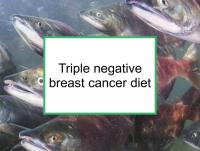Vitamin D is vital for normal bone development since it regulates the flow of calcium into the bloodstream. However, vitamin D also has important roles in parathyroid, neuromuscular, insulin and immune functions. Vitamin D3 (cholecalciferol) is the form most useful to human beings. Women with breast cancer are often deficient in vitamin D.
Low vitamin D levels have been linked to increased risk of breast cancer development and poorer outcomes. Now a new study has reported how vitamin D favorably influences genes in triple negative (ER-/PR-/HER2-) cells that are known to promote invasion and metastasis.
Latest research shows how vitamin D reduces metastasis in ER- cells
The study referenced at the beginning of this news article was designed to examine the molecular actions of the vitamin D receptor in triple negative breast cancer. To conduct the study, the authors used ER- invasive mammary tumor cell lines established from ordinary and vitamin D receptor knockout (VDRKO) mice. Using these cells, they first showed that the vitamin D receptor is necessary for 1,25-dihydroxyvitamin D3 (vitamin D) mediated anti-cancer actions. They then identified targets of this receptor that influence ER- breast cancer.
Re-introduction of human vitamin D receptor into VDRKO cells restored the antiproliferative actions of vitamin D. Genomic profiling demonstrated that vitamin D altered gene expression in the cells. A total of 35 genes were found to be regulated by vitamin D in vitamin D receptor-positive cells. Four of these genes (whose expression was markedly reduced by vitamin D) are known to promote breast cancer invasion and metastasis.
The authors comment that the study results demonstrate how vitamin D acts to suppress the production of multiple proteins that are required for survival of triple negative breast cancer cells. They further state that since studies have demonstrated a high prevalence of vitamin D deficiency in women with triple negative breast cancer, correction of vitamin D deficiency in these women represents a reasonable, but as yet untested, strategy to delay recurrence and improve survival.
Please see our articles on vitamin D and what triple negative patients and survivors should eat for more information.
